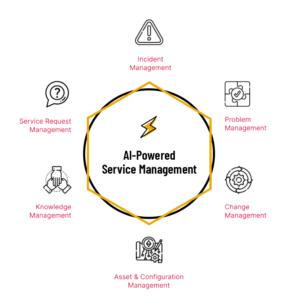Achieving Agile Customer Support With Jira Service Management
Agile Customer Support FAQs addressed in this article:
-
What is Agile Customer Support? – Agile customer support refers to the ability of a business to quickly adapt, efficiently respond to customer needs, and maintain high-quality service, even as demand increases. It’s essential for companies experiencing rapid growth to ensure customer satisfaction and loyalty.
-
Why is Agile Customer Support important for growing businesses? – For businesses undergoing rapid expansion, agile customer support is crucial because it helps manage the increasing complexity of customer interactions without compromising service quality. It ensures that businesses can meet and exceed customer expectations, turning new users into loyal advocates.
-
How does rapid growth affect customer support? – Rapid growth can strain customer support systems, leading to longer response times, decreased resolution quality, and a tarnished brand reputation. Agile customer support solutions are necessary to adapt to fluctuating demand without compromising service quality.
-
What are the pitfalls of rapid growth in terms of customer support? – The primary pitfalls include over-hiring, which can impact company culture and finances, and the risk of delivering an unreliable customer experience during growth surges. Both can significantly hinder a company’s long-term sustainability and customer satisfaction.
-
How can businesses implement Agile Customer Support? – Businesses can implement agile customer support by leveraging technology and strategic planning to build a scalable and efficient support system. This includes using automation, AI, analytics, and machine translation to handle increased demand and maintain service quality.
-
What role does technology play in Agile Customer Support? – Technology, including automation, AI, and analytics, plays a central role in agile customer support by reducing the workload on human agents, enabling efficient ticket routing, and providing insights for continuous improvement. It allows for scalable solutions that adapt to changing demands.
-
Can Agile Customer Support improve customer satisfaction? – Yes, agile customer support significantly improves customer satisfaction by ensuring quick, efficient, and high-quality responses to customer inquiries. It helps businesses maintain a positive reputation and foster long-term loyalty among customers.
-
What is Jira Service Management, and how does it support Agile Customer Support? – Jira Service Management (JSM) is an ITSM and customer support tool that embodies the principles of agile customer support. It offers features like automation, self-service portals, incident management, and change management to streamline support operations and enhance customer satisfaction.
-
How does Jira Service Management enhance the efficiency of customer support operations? – Jira Service Management enhances efficiency by automating repetitive tasks, enabling self-service for common inquiries, and providing robust incident and change management features. This allows support teams to focus on more complex issues and improves overall service quality.
-
Why should companies consider pursuing Agile Customer Support with JSM? – Companies should consider agile customer support with JSM because it offers the agility, scalability, and efficiency required to navigate the challenges of expansion while ensuring customer satisfaction remains a priority. It’s a strategic advantage in today’s competitive landscape.
In the fast-paced world of business, rapid growth is often seen as the ultimate indicator of success. However, this exhilarating expansion brings with it a set of challenges that, if not managed carefully, can quickly overshadow the triumphs.
Among these challenges, maintaining high-quality customer support in the face of surging demand stands out as a critical hurdle. As companies scale, the complexity of managing customer interactions grows exponentially, making agile customer support not just beneficial, but essential for sustaining growth and ensuring customer satisfaction.
Why Agile Customer Support?
The importance of agile customer support in this context cannot be overstated. It represents the ability of a business to adapt quickly, respond to customer needs efficiently, and maintain the quality of service that customers have come to expect, even as the volume of those needs increases. This agility in customer support becomes a linchpin for companies navigating the turbulent waters of rapid growth, ensuring that they can not only meet but exceed customer expectations, turning new users into loyal advocates.
In the following sections, we will explore the pitfalls of rapid growth, such as the impact of over-hiring on company culture and finances, and the risk of delivering an unreliable customer experience during growth surges. We will also delve into how businesses can leverage technology and strategic planning to build a customer support system that is not only agile but also scalable and efficient.
Through this exploration, we aim to provide a roadmap for companies looking to embrace growth without the fear of success, ensuring that their customer support remains a beacon of excellence no matter how fast they grow.
The Pitfalls of Rapid Growth
Some powerful arguments were made in a recent Forbes article about rapid growth. While often celebrated as a sign of success, it can introduce significant challenges that, if not addressed, may hinder a company’s long-term sustainability and customer satisfaction. Two primary pitfalls stand out in this context: over-hiring and its impact on company culture and finances, and the risk of unreliable customer experience during growth surges.
Over-Hiring and Its Impact
In the rush to meet increased demand, companies may fall into the trap of over-hiring. This rapid expansion of the workforce is intended to bolster capacity but can inadvertently lead to several issues.
- Financially, the increased payroll can strain budgets, especially if the growth slows or becomes more variable.
- Culturally, injecting a large number of new employees into an organization can dilute the established company culture, leading to disengagement and reduced productivity among both new and existing staff.
The challenge, then, is to scale operations without disproportionately increasing the workforce, maintaining a balance that supports growth while preserving the company’s core values and financial health.
Unreliable Customer Experience During Growth Surges
Perhaps more directly related to customer support, rapid growth can strain existing support channels to the breaking point.
As the volume of customer inquiries and issues escalates, companies may find their support teams overwhelmed, leading to longer response times, decreased resolution quality, and ultimately, a tarnished brand reputation. This scenario underscores the importance of scalable and agile customer support solutions that can adapt to fluctuating demand without compromising service quality.
Principles of Agile Customer Support
Agile customer support is not just about responding quickly to customer inquiries; it’s about creating a responsive, flexible, and efficient support ecosystem that can adapt to changing demands and scale with the company. Drawing from the insights shared in the Forbes article and the capabilities of modern support solutions, here are key principles that underpin agile customer support:
Automation, Bots, AI, and Analytics for Efficiency
Automation and artificial intelligence (AI) are at the heart of agile customer support. By automating routine tasks and responses, companies can significantly reduce the workload on human agents, allowing them to focus on more complex and high-value interactions. Bots can handle initial customer inquiries, triage support tickets, and even resolve common issues without human intervention.
Analytics play a crucial role in this ecosystem by providing insights into customer behavior, ticket trends, and agent performance, enabling continuous improvement and strategic planning.
Machine Translation for Global Audience Support
In today’s global marketplace, offering support in multiple languages is a competitive advantage. Machine translation technologies enable companies to provide timely and accurate support to customers worldwide, regardless of language barriers.
This capability ensures that businesses can expand into new markets with confidence, knowing that their customer support system is equipped to handle a diverse customer base.
Human Touch for Complex Issues and Relationship Building
Despite the advances in AI and automation, the human element remains irreplaceable in customer support. Human agents are better equipped to handle complex issues, provide empathetic responses, and build relationships with customers.
An agile customer support system seamlessly integrates technology and human expertise, ensuring that customers receive the right level of support at every interaction. This balance between technology and human touch is essential for creating meaningful customer experiences and fostering long-term loyalty.
Jira Service Management: A Tool for Strategic Agility
Jira Service Management stands out as a powerful ITSM and customer support tool that embodies the principles of agile customer support. It offers a comprehensive suite of features designed to streamline support operations, enhance efficiency, and improve customer satisfaction.
Overview of Jira Service Management Features
- Automation and AI: JSM includes robust automation rules that can handle repetitive tasks, route tickets based on priority and category, and even escalate issues as needed, all without manual intervention.
- Self-Service Portals: With JSM, companies can set up customized self-service portals that allow customers to find answers to common questions, submit tickets, and track their progress, reducing the demand on support agents.
- Incident Management: JSM’s incident management features enable teams to quickly respond to and resolve incidents, minimizing downtime and customer impact.
- Change Management: The platform supports agile change management processes, allowing teams to implement changes with speed and efficiency while maintaining control and minimizing risk.
By leveraging JSM, companies can implement a scalable, efficient, and responsive customer support system that aligns with the principles of agile support.
Getting the Most Out of Your JSM-Powered Agile Customer Support System
Expanding on the strategies for implementing agile support with Jira Service Management, it’s crucial to delve deeper into how these strategies can be applied effectively to enhance customer support operations. Here are more detailed insights and actionable steps for each strategy:
Setting Up a Scalable Support Structure
- Customization for Specific Needs: Beyond basic customization, consider leveraging JSM’s advanced features like dynamic forms and conditional fields that adapt based on previous answers, providing a more tailored experience for users. This level of customization ensures that the support process is as efficient as possible, gathering all necessary information upfront.
- Integration with Existing Systems: To achieve a truly unified service management approach, utilize JSM’s extensive API capabilities for deeper integrations. For example, integrating JSM with analytics platforms can provide real-time insights into customer satisfaction and agent performance, while integration with development tools can streamline the bug reporting and resolution process.
- Scalable Architecture: For organizations expecting significant growth, leveraging JSM’s cloud offerings can provide the flexibility and scalability needed without the overhead of managing infrastructure. Cloud solutions offer the added benefit of automatic updates, ensuring you always have access to the latest features and security enhancements.
Integrating AI and Machine Learning for Automated Ticket Routing and Responses
- Leverage JSM’s Automation Rules: Advanced use cases for automation include setting up multi-tiered support workflows that escalate issues based on complexity or time to resolution. This ensures that customers are always interacting with the agent best suited to resolve their issue, improving resolution times and customer satisfaction.
- Implement AI-driven Responses: When integrating AI-driven chatbots, consider training them not just on FAQs but also on historical ticket data. This allows the chatbots to provide more accurate and contextually relevant responses. Additionally, implementing natural language processing (NLP) can enhance the chatbot’s understanding of customer queries, making interactions more natural and effective.
Utilizing Jira’s Reporting and Analytics for Continuous Improvement
- Data-Driven Insights: Implement custom dashboards within JSM to monitor key performance indicators (KPIs) such as average resolution time, customer satisfaction scores, and ticket backlog. These dashboards can be tailored to different levels of the organization, providing relevant insights for both frontline agents and executive leadership.
- Feedback Loops: Utilize JSM’s survey features to automate post-resolution customer feedback collection. This feedback can be directly linked to specific tickets and agents, providing actionable insights for individual and team performance improvements.
- Proactive Problem Management: Employ predictive analytics to identify potential issues before they become widespread. By analyzing trends in ticket data, you can anticipate customer needs and create knowledge base articles or FAQs to address common concerns proactively.
Implementing these strategies with Jira Service Management not only enhances the agility and efficiency of customer support operations but also positions organizations to better manage the challenges of rapid growth. By focusing on customization, integration, and continuous improvement, businesses can ensure that their customer support systems scale seamlessly with their growth, maintaining high levels of customer satisfaction and operational excellence.
Case Studies: Agile Support in Action
Global Tech Manufacturing Leader
A leading technology company, with over 160,000 employees and generating more than $100 billion in annual revenue, faced a significant challenge. Despite collecting vast amounts of data from service interactions, leveraging this data for efficient service delivery and customer delight remained elusive. Partnering with Cprime, the company implemented Jira Service Management, transforming its service management approach and realizing potential savings of millions of dollars annually.
- The Challenge: The tech giant struggled to utilize the extensive data collected from customer service interactions effectively. The data, stored as freeform text within Jira issue tickets, made identifying trends and root causes a manual and labor-intensive process. This inefficiency hindered the company’s ability to deliver fast and convenient solutions to customer issues, impacting both cost control and customer satisfaction.
- The Solution: Cprime recommended a customized implementation of Jira Service Management to make the data instantly actionable. This solution involved setting up a new JSM Data Center instance, creating custom data fields, and configuring a database for enhanced data analysis and reporting. Additionally, custom integrations with other tools were developed to support data gathering, reporting, and workflow automation.
- The Results: The implementation of JSM led to a 15-minute reduction in average handling time per issue, enabling greater productivity and enhancing customer satisfaction. The service teams can now leverage the data more effectively, identifying trends and root causes within ten defect types across dozens of custom fields. This scalability and efficiency have resulted in forecasted annual savings of millions of dollars.
Global Lifestyle Retail Brand
A multinational lifestyle retailer, with over 26,000 employees and a presence across North America, Europe, and the Middle East, sought to improve its ITSM and internal service desk infrastructure. Collaborating with Cprime, the retailer implemented a customized Jira Service Management solution, significantly enhancing communication, support efficiency, and proactive issue resolution.
- The Challenge: The retailer faced difficulties in maintaining effective ITSM due to communications bottlenecks, especially in supporting corporate staff and store workers across its extensive retail network. The lack of clear reporting methods and a single service funnel for all requests led to inefficient routing and unproductive churn.
- The Solution: Opting for Jira Service Management to integrate seamlessly with its existing Atlassian ecosystem, the retailer engaged Cprime to customize JSM to its specific needs. The project focused on establishing support queues for Facilities and Change Management and Approval systems, followed by tackling the more complex Corporate and Retail Service Management systems.
- The Results: The implementation of JSM has already shown significant improvements in communication and user adoption. The streamlined service request intake process has reduced the time required to direct support team members to pending tasks. Management now benefits from enhanced reporting, providing essential information for proactive issue response and identifying service bottlenecks.
These case studies demonstrate the transformative impact of Jira Service Management in enabling agile support, from a tech giant saving millions through efficient data utilization to a global retailer streamlining its ITSM processes. Through Cprime’s expertise, both organizations have achieved strategic agility in their customer support operations, setting a new standard for excellence in service delivery.
Is it Time to Pursue Agile Customer Support with JSM?
The journey towards sustaining rapid growth while maintaining exceptional customer support is complex, yet achievable with the right tools and strategies. Agile customer support is not just a necessity but a strategic advantage that can set your business apart in today’s competitive landscape.
Jira Service Management stands out as a pivotal tool in this endeavor, offering the agility, scalability, and efficiency required to navigate the challenges of expansion and ensure customer satisfaction remains at the forefront.
Are you ready to elevate your customer support to new heights and embrace the opportunities that come with rapid growth? Cprime’s expertise in Jira Service Management solutions offers a pathway to achieving agile, scalable, and efficient customer support tailored to your business’s unique needs.





